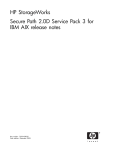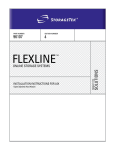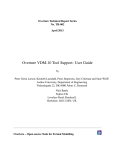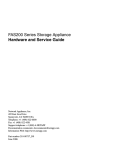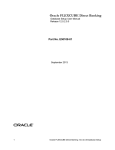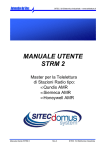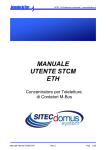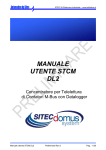Download Cambex AIX User guide
Transcript
Dynamic Path Failover Driver for AIX FibreQuik Host Bus Adapter Installation and User Guide Cambex Corporation 115 Flanders Road Westborough, MA 01581 Customer support [email protected] Document: Date: Rev.: 081-468-025 04/21/10 K Table of Contents DYNAMIC PATH FAILOVER FOR AIX ................................................ 3 Introduction............................................................................................ 3 SAN Management................................................................................... 4 Storage Management ............................................................................. 4 Path Management .................................................................................. 4 SCSI and FCP Drivers ........................................................................... 5 Load Balancing ...................................................................................... 5 HOW PREFERRED PATHS WORK........................................................ 6 Multiple LUNs........................................................................................ 6 More than two paths............................................................................... 6 Multiple Hosts ........................................................................................ 7 ADAPTER SPECIFICATIONS.................................................................. 9 Trademarks ............................................................................................ 9 SOFTWARE AND HARDWARE INSTALLATION............................. 10 Driver Installation (command line)...................................................... 10 Driver Installation (smit) ..................................................................... 12 Hardware Installation.......................................................................... 13 AutoRecover ......................................................................................... 14 AIX Configuration................................................................................ 15 Persistent Bindings............................................................................... 16 SMIT COMMANDS .................................................................................. 17 Commands............................................................................................ 17 Path Management Commands ............................................................. 18 Manage Licensing ................................................................................ 19 How to set path preferences ................................................................. 20 TROUBLESHOOTING ............................................................................ 22 ERROR MESSAGES................................................................................. 26 UPGRADING THE DRIVER ................................................................... 27 APPENDIX A ............................................................................................. 28 Identifying Fibre Channel Components ............................................... 28 PC2000 LED Meanings ....................................................................... 31 PC4000 LED Meanings ....................................................................... 32 1 DECLARATION OF CONFORMITY .................................................... 33 Warning................................................................................................ 33 SAFETY NOTICES ................................................................................... 34 FCC Warning....................................................................................... 34 Safety Notice ........................................................................................ 34 DYNAMIC PATH FAILOVER LICENSE AGREEMENT .................. 35 2 Dynamic Path Failover for AIX Introduction The Cambex FibreQuik™ Fibre Channel host bus adapters provide attachment of Fibre Channel devices to PCI or Micro Channel based servers. They support the SCSI-FCP protocol. When used with the Cambex DPF (Dynamic Path Failover) software, two adapters in a system provide greater throughput and total protection from failure of a fibre channel component. In addition, the Cambex AutoRecover daemon, cbxdpfar, will automatically detect when a failed path has been repaired and make it available as a standby path. For arrays that support preferred paths, AutoRecover will automatically resume operation on the repaired path, otherwise, an operator may manually change paths to do load balancing. Storage (SAN) and communications (LAN) networks have resulted in a physical and logical separation between the storage device (typically a SAN-connected RAID array), the storage user (typically an Enterprise Server, which we will refer to below as the server) and the administration station (typically a remote workstation). As storage systems have evolved from JBOD (just bunch of disks) to complex shared RAID systems, the management software has also grown in complexity. The following sections describe the different levels of management software. 3 SAN Management SAN Management is the top layer. It is responsible for assigning the required access for each server to each storage device. The unit of storage is the LUN (Logical Unit Number) which acts the same as a single disk directly attached to the server. In reality, a LUN is made up of portions of a number of disks under the direction of a RAID controller in the storage device. SAN Management typically requires a process running on each managed server communicating with the manager running on the administering station. Storage Management The Storage Management layer, or RAID manager, is the layer that communicates with the RAID controllers on the storage device. This is the layer used to create, modify or delete LUNs. The Storage Management layer may provide SAN Management functions, but only for the specific storage device being managed. Storage management typically runs on a server attached to the storage device (in-band) but may also run over a network (out-of-band). Path Management Path Management includes a variety of software for managing the various fibre channel components such as HBAs (Host Bus Adapters), hubs and switches. It is used to display path status and allow control over multiple paths between servers and storage. To avoid having to access a large number of unrelated software interfaces, integration of the various Path Management components is usually done using a management tool 4 communicating via a network connection to each managed device. The Cambex Dynamic Path Failover driver is a Path Management component that allows multiple paths to a storage device and provides automatic failover between available paths. Cambex Dynamic Path Failover software provides both a command line interface and access through smit, the standard integrated management tool for AIX. SCSI and FCP Drivers AIX makes two types of device drivers available. SCSI device drivers support SCSI-2 disk and tape devices. FCP device drivers support newer SCSI-3 disk and tape devices, which provides a larger address space for target ID and LUN. When using the FCP device driver, the adapter will be configured with a name like fscsi2. Load Balancing Selection of which path to use happens in one of three ways. Static load balancing allows the operator to select which path is used to access a LUN. This is the default method. Preferred Paths allow certain RAID arrays to automatically specify a path choice. See the next section on Preferred Paths for more information. Finally, turning on Load Balancing will send I/O on all available paths using round robin scheduling. 5 How Preferred Paths work The basic idea of multipathing is fairly simple. Access a disk on one of two paths. If the path fails, move I/O activity to the other path. We build on that basis by adding more factors into the configuration and seeing what effect they have. A path is defined as an end-to-end connection through a SAN, ignoring any intermediate routing points. A complex SAN may have multiple connections from an HBA to a storage device, but this is invisible to the software. The combination of one HBA to one target is one path, regardless of how it is routed. Multiple LUNs The effect of multiple LUNs on a RAID controller is that we can choose to distribute them so as to balance the I/O across multiple paths. The choice can be made in one of two ways. If one RAID controller has preference over the other, we call this "controller preference". If the selection is made in the host software we call this "target preference". A third type of preference is to lock a LUN to a particular HBA, called "HBA preference". More than two paths With four paths (for example) we have to sort the paths into an order in which they are chosen when the primary path fails. This order should depend on getting the best performance when a path segment fails. For example, if our performance is limited by the IOPS that can be handled by each RAID controller, then we want to balance the LUNs between the RAID controllers, 6 and set up preferences so that the remaining paths to the same controller are preferred over paths to the alternate controller. Example 1) Suppose we have two HBAs, a switch, and two RAID controllers. A total of four cables, and four paths to each LUN (2 HBAs x 2 RAID controllers). We use the RAID controller preference to select which controller each LUN is accessed on. The target preference lets me balance those accesses across the two HBAs. Example 2) We have two switches, 2 HBAs and 2 RAID controllers, a fully redundant system. We add an inter-switch link for in-band management, but we do not want to use this as a data path if there are any other paths available. We set the ISL paths' target preference lower than the direct paths, so they will be used last. Example 3) A 2G RAID array is connected to a 2G switch, which does speed matching to two 1G HBAs in the host. To avoid saturating either of the 1G paths, We use HBA preference when balancing the LUNs across the paths. Multiple Hosts When we have more than two hosts accessing the same storage, we find that the limit is usually the number of controller ports. The HBAs will run below the maximum bandwidth, but the controllers need to be balanced. Use the controller preferences and target preferences to balance the loads. Normally, each host accesses different LUNs through either controller, so all paths are independent. One special case is where a RAID controller has LUN groups. All LUNs in a LUN group are accessed on the same controller. If the different LUNs 7 are accessed by different hosts, we could have the problem of "thrashing". One host tries to move the LUN group to preferred controller A while the other host tries to move the group to preferred controller B. Anti-thrashing code prevents this problem in the multipathing software. 8 Adapter Specifications Bus Data rate (each dir.) PC2000LC-HPSP PC4000 (Single Port) PC2000LC-A PC4002 (Dual Port) PCI PCI-X 2.0 100/200 100/200/400 MB/s Bus Data rate (each dir.) PC4000e (Single Port) PC4002e (Dual Port) PCI-e x4 100/200/400 MB/s Cable length - copper - multimode optical - single mode optical Voltage Power Shipping weight 30 500 10 3.3 or 5 7.2 10 70 m 3.3 8.0 10 V W oz Trademarks Dynamic Path Failover and FibreQuik are trademarks of Cambex Corporation. 9 Software and Hardware Installation Driver Installation (command line) It is recommended that the drivers be installed prior to installing the HBAs. The examples assume that the driver CD is mounted at /mnt and that you are installing on AIX 5.1. The name and revision level of the uninstalled driver image may be examined by issuing the command (as root): installp -ld <device> where <device> is the path to the drivers, such as /mnt/AIX6/ for the CD or the name of a driver directory on the hard disk. Example output would be: Fileset Name Level I/U Q Content ============================================== PC2000.driver.obj 2.6.10.42 I b usr # PC1000 Fibre Channel Adapter Driver (AIX 5L) cbxdpf.driver.obj 6.1.1.29 I # Cambex Dynamic Path Failover Driver b usr Before installing a new version of the driver, delete the previous version of the driver. Note that any file systems must be unmounted, volume groups exported and SCSI devices must be removed before removing the driver. Be sure to have a complete backup of all data before updating the driver. The command to remove the driver is: installp -u <name>.driver.obj where names are cbxdpf and PC1000 or PC4000 as shown above. 10 The new driver may be installed on the system with the command: installp -acd <device> all where <device> is as described above. example: installp -acd /mnt/AIX6.1 all After installing the driver, see the README file for additional information and release notes. /usr/lpp/cbxfc/READ_ME /usr/lpp/PC4000/READ_ME /usr/lpp/cbxdpf/READ_ME 11 Driver Installation (smit) The smit path is Software Installation and Maintenance Install and Update Software Install and Update Software by Package Name For item " INPUT device / directory" use /mnt/AIX6.1 or the directory where the image files are located. A list should pop up with the name of the drivers. Select and press enter. Also make sure that the following drivers are loaded from the AIX installation media. devices.fcp.disk.rte devices.fcp.tape.rte The recommended maintenance levels for AIX are specified in the image file prereq section. If not at the correct maintenance level, the driver installation will fail. The current level may be found from the command: instfix -i |grep ML Please note: Installation may fail if conflicting drivers are present for the same devices. Only one driver may be installed on AIX for a given device type. When conflicting drivers are found, the names should be displayed on the screen. Make a note of them and use “smitty remove” to remove them plus all dependent software. On the smit screen, you can press the “F4” key to search for the full name of the conflicting driver(s). After they are selected, change “remove dependent software” from “no” to “yes”. After the drivers are removed, you should now be able to install the Cambex drivers. 12 Hardware Installation Power down the system and install the adapter in a free slot. The PCI cards may be installed in either 32 or 64-bit PCI card slots, however the 32-bit slots may limit performance at high data rates. Make sure that any cables do not block airflow to the card. Observe proper static precautions. Detailed procedures for opening the case and for suggested adapter placement may be found in the Operator Guide for the specific server model. When using copper cable, it is extremely important that the building wiring present a low impedance ground path to the frame of the device and the host with which it will communicate. Noise due to copiers or large machinery sharing the electrical circuits is a common cause of signal integrity problems. 13 AutoRecover cbxdpfar, the AutoRecover daemon, is automatically installed and enabled when the DPF driver is installed. Control of the daemon is done using SRC. stopsrc -s cbxdpfar Stops AutoRecover startsrc -s cbxdpfar Starts AutoRecover AutoRecover works by periodically polling the standby paths to each LUN. If the polls fail, the path is marked as failed. If the polls succeed, the path is marked as available for use. If path preferences are set up, the AutoRecover daemon will move I/O to the preferred paths when they become available. AutoRecover also deletes paths to hdisks that have been removed from the system. See the section on SMIT for changing the default AutoRecover timing parameters. 14 AIX Configuration During power-up initialization, AIX will find and configure the new adapter(s) and any supported devices using the driver's configuration method. Devices are assigned a SCSI ID as they are discovered starting with 0. SCSI ID is not related to loop ID, port ID or to SCSI ID assignment on other hosts. It is a logical value bound to the fibre channel WWN of the device. Configuration may also be run from the command line: cfgmgr Once disks have been configured, the standard AIX utilities may be used to build volume groups, logical volumes and file systems. See the AIX System Management Guide for a detailed explanation. Find out the names of the installed adapters with the command: lsdev -Cc adapter In arbitrated loop, the ID of each device must be unique. For disk drives, the ID is typically set by switches on the drive enclosure. The adapter ID is soft assigned and may be examined after it is participating with the mbtest command. If the adapter name found by the lsdev command were fscsi1, the command would be: /usr/lpp/cbxfc/mbtest fscsi1 id The requested ID may be changed in the database to any nonconflicting value in the range 0 to 126 with the command: chdev -l fscsi1 -a id=6 –P The ID attribute has no effect in a fabric environment. 15 Persistent Bindings Persistent Bindings is the term used to indicate the mapping of SCSI ID to FC Worldwide Name (WWN). By keeping a persistent binding, the loop ID or port ID of a device may change and the device will still be properly addressed. In the Cambex AIX driver, persistent binding is automatic. At configuration time, all devices that are found are automatically assigned to a SCSI ID and a persistent binding is created. Persistent bindings are by portname and are kept in the ODM database. They are preserved and restored at reboot for all FC devices. To display the SCSI ID to WWN mapping for all adapters and devices, issue the command: /usr/lpp/cbxfc/fctest When replacing a failed device on a SAN, we want to keep the same SCSI ID but change the WWN binding to the replacement. A perl script is provided for doing this: /usr/lpp/cbxfc/FRU_replace 16 SMIT Commands Commands The adapter management commands available in SMIT are in the devices menu under Cambex Fibre Channel Adapter: List all Cambex FC adapters This provides the name and location of each adapter. Change / Show Characteristics of a Cambex FC Adapter Allows the user to display and modify attributes. Attributes (and default values) include: exec_throttle (256) number of simultaneous I/O operations. dma_window (64) PCI DMA memory window in MB. retry_delay (3) Delay in seconds after bus reset or other error. logout_delay (7) Time in seconds allowed for ports to be logged out before failing I/O. topology_list (LOOP_P2P) Automatically detect topology. May also be forced to LOOP_ONLY or P2P_ONLY. frame_size (2048) Maximum FC frame size. Choices are 1024 or 2048. infinity (300) Maximum SCSI command timeout in seconds. Set to 0 to disable. GHz (auto) Auto-detect fibre channel rate in GHz. May also be forced to 1 or 2. Ignored on 1GHz cards. 17 sw_fc_class (3) Fibre channel class. devtype_exclude ( ) List of SCSI device types to ignore during configuration. For example, specifying "1,5" would exclude both tape and CD devices. Attributes only used in loop mode include: id (0) Default L_ID for adapter. See table of L_ID to ALPA. login_on_lip (yes) Full login if LIP occurs. full_duplex (no) Use full duplex loop open, OPNyx. Generate Error Report Accesses the AIX error logging facility. Trace Cambex FC Adapters Runs the AIX trace facility, looking only for the entries specific to the adapter driver. Path Management Commands The path management commands available in SMIT are in the devices menu under Cambex Dynamic Path Management: List all Cambex Dynamic Paths This provides the information on all paths and devices known to the DPF driver. Use this when installing to verify that all paths have been found and configured. Change / Show Characteristics of a Cambex Dynamic Path Displays the current path status and allows the user to place paths online/offline or to change path preferences. 18 The autorecover daemon will automatically move operation to preferred paths. The preferred path is the combination of path preference values for HBA, device and path. For some arrays, target device preference is read automatically from the array at configuration time. Consult the array user manuals for more information. Change / Show Characteristics of Cambex Managed HBA’s Used to display and change HBA preference for one or more adapters. Trace Cambex Dynamic Paths Runs the trace facility, looking only for the entries specific to the DPF driver and adapter driver. Manage AutoRecovery Subsystem Provides the following functions: Show Status of AutoRecovery Subsystem Start AutoRecovery Subsystem Stop AutoRecovery Subsystem Change / Show AutoRecovery Subsystem Parameters Parameters are: -n Number of successful inquiries (3 - 9) -t Seconds between inquiries (3 - 3599) -r Seconds between ODM updates (automatic) Manage Load-Balancing Enable or disable dynamic load balancing for the selected disks. Manage Licensing Allows the user to enter a new license for the DPF software, overwriting the existing license, or to display the expiration date of the current license. To enable a one-time-use, 30-day license 19 for use until the purchased license is received. Issue the commands: cd /usr/lpp/cbxdpf mv license.30day license cfgmgr Licenses for OEM versions of the driver are obtained from the storage vendor who provided the software. The generic version of DPF purchased from Cambex is licensed for use only on Cambex cards and on only one LPAR. A license token is provided with the purchase. Contact Cambex support by email to obtain a license. You will need to provide The license tokens for each card Host machine ID from 'uname –a -L' The output of /usr/lpp/cbxfc/dpfinfo How to set path preferences Controller preference is set on the RAID controller using RAID Management software provided by the storage vendor. HBA preference and Target preference are set in the host using the dpfutil Path Management software, or in the smit menus. The preference value, although internally combined numerically, is a yes/no value in the user interface. HBA preference outweighs controller preference. It defaults to yes (all HBAs are preferred) but can be changed to no with the tool. Target preference ranks lower than controller preference and defaults to no (no preferred path) but may be changed to yes with the tool. Path priority is the combination of the following factors, which are listed from highest to lowest. 20 • • • failed or offline status is considered first. A path will not be used if failed or offline. Anti-thrashing prevents paths to the wrong controller from causing thrashing. HBA preference - normally all HBAs have equal preference to paths. To block an hba from using a path, do: Command line: dpfutil hba_set_wwn cbx0 no (default is yes) to list HBA preferences: odmget -q"attribute=hba_pref" CuAt in smit: Devices -> Cambex Dynamic Path Management -> Change / Show Characteristics of Cambex Managed HBAs • • Controller preference - this is for multi-controller RAID arrays where one or more of the controllers reports that it owns the LUN. Controllers which do not report preference, are treated equally. Target preference - To make one path higher preference than other paths to the same LUN, use target preference. Command line: dpfutil target_set_wwn cbx10 yes (default is no) to list target preference: odmget -q"attribute=tgt_pref" CuAt in smit: Devices -> Cambex Dynamic Path Management -> Change / Show Characteristics of Cambex Dynamic Paths -> Change / Show Physical Path Routing Preferences 21 Troubleshooting Use the errpt command to identify the cause of failure. The lsdev command will provide the location of the component. For example, if errpt identifies a loose cable on device hdisk1, lsdev will give an address similar to: hdisk1 Available 00-02-01 Cambex SCSI... and lsattr -El hdisk1 will show: clr_q no Device CLEARS it’s Queue on error location Location Label lun_id 0x0 Logical Unit Num ID node_name 0x20000080e511b744 FC Node Name pvid none Physical Volume id q_err yes Use QERR bit q_type simple Queuing TYPE queue_depth 16 Queue DEPTH reassign_to 120 REASSIGN time out rw_timeout 30 READ/WRITE timeout scsi_id 0x0 SCSI ID start_timeout 60 START UNIT timeout ww_name 0x23000080e511b744 FC World Wide Name Which indicates that the adapter is in card location 00-02, and the drive is at SCSI ID 0, LUN 0. 22 Checklist for driver and HBA installation The following commands may be used to isolate problems during installation of the fibre channel driver and card. Type the command shown in bold and verify the output. must give: Fileset Path: /usr/lib/objrepos PC1000.driver.obj Level 01.05.00.00 (or greater) State Committed Description Cambex Fibre Channel Adapter Driver lslpp -l PC1000.driver.obj lsdev -Cc adapter should print a line for each card: fscsi<x> <x> is a unique number for each SCSI card Available <SS-SS> <S> is the location in the machine where the card is installed Check that the number of SCSI cards and their slots are correct If 'Available' then card and driver are installed. If 'Defined' or not listed then card was not found. lscfg -vl fscsi4 DEVICE should print more information for a card: LOCATION fscsi4 00-03 Channel I/O Controller DESCRIPTION Cambex Fibre Manufacturer................CAMBEX Machine Type and Model......MC1000F ROS Level and ID............V2.01.04 Serial Number............... 2354 Displayable Message.........Cambex Fibre ... Network Address.............500502E020000932 Device Specific.(Z0)........Build:TMNX 23 cfgmgr -v >/tmp/cfg.log 2>&1 Should identify the card and configure it. If cfg.log contains the ID 7710002x and no driver is found, then the adapter driver is not installed. During boot, the number displayed when configuring the adapter is hex 0x911 (FC adapter). /usr/lpp/cbxfc/mbtest fscsi1 This test code may be used to get fibre channel status from the adapter or from attached devices. Type the command as above for a list of subcommands. /usr/lpp/cbxfc/mbtest fscsi1 fab This command will list the persistent bindings between SCSI ID and WWN on adapter scsi1. It will also list the loop ID and port ID (fabric address) which can change dynamically as devices are connected or disconnected. /usr/lpp/cbxfc/mbtest fscsi1 getp This command will show the fibre channel ports which are currently logged in to adapter scsi1. /usr/lpp/cbxfc/sctest fscsi1 This test code may be used to get IOCINFO information from the adapter or to see the results of SCSI Inquiry or TestUnitReady commands to SCSI devices attached to the adapter. Type the command as above for a list of subcommands. /usr/lpp/cbxdpf/dpfutil listall This will list the failover devices and paths. The active path will be shown on the left. Status is shown by letter codes: “F’ indicates a failed path. “O” indicates offline paths. 24 The message no failover devices available indicates that the attached storage is not yet recognized by the DPF driver. This could mean that a platform kit needs to be installed for your storage or that the storage is not yet configured. /usr/lpp/cbxfc/runtrace This should be run to start a trace if Cambex support requests a trace of the card failure. To stop the trace and generate a trace report, type: trcstop; trcrpt > /tmp/trc.log Questions or problems related to Cambex fibre channel adapters may be e-mailed to: [email protected] 25 Error Messages Various errors and notifications will be placed in the AIX error log. These can be read using the errpt command, or automatic notification may be set up. DPF_FAILOVER This indicates that the active path to a device has failed, and that DPF successfully transferred I/O to an alternate path. DPF_STDBYDN This indicates that a path other than the active path has failed to a device. DPF_UNRECOV This indicates that the active path to a device has failed, and that DPF was not successful in transferring I/O to an alternate path. DPF_OFFLINE DPF_ONLINE These messages indicate that a path has been manually set to the offline or online state. DPF_LIC_WARNING DPF_LIC_EXPIRE These messages indicate that a temporary license for the DPF software is either close to or has expired. Once the DPF license has expired, you will need to uninstall the DPF driver in order to regain access to the hdisks. 26 Upgrading the Driver When upgrading to a newer version of the driver there are two methods: 1) Use rmdev to remove all dependent devices, remove the existing driver(s), then install the new driver(s) and run cfgmgr to recreate the devices. This method allows a new driver to be installed without rebooting the server. File systems which are unmounted before the process may be mounted again afterwards without affecting the data. 2) Install the new driver with devices in place. The server must be rebooted afterwards so that the driver on disk will match the driver in memory. When upgrading AIX to a new major version, remove the drivers beforehand and install the new versions after completing the AIX upgrade. 27 Appendix A Identifying Fibre Channel Components Copper DE9 GBIC Copper DE9 Cable 28 Copper HSSDC Cable Duplex SC Optical GBIC 29 Small form factor (SFF) optical LC cable 30 PC2000 LED Meanings Top LED – Transceiver hardware is detecting a signal. Middle LED – Firmware is being synchronized. Bottom LED – Flashing amber when not synchronized. LED TOP MIDDLE BOTTOM NORM GREEN GREEN OFF 31 BAD CABLE GREEN OFF FLASHING NO CONN OFF OFF FLASHING PC4000 LED Meanings Y G A Y Off On Flash Off Off On/Flash ∗ G Off On Flash Off On/Flash Off A Off On Flash On/Flash Off Off No Power Power Applied Initializing * 1G (Flash indicates active) 2G (Flash indicates active) 4G (Flash indicates active) Flashing in unison indicates initialized, while alternate flashing indicates a firmware error. Y G A 32 Declaration of conformity We Cambex Corporation of Westborough, Massachusetts, USA, declare under our sole responsibility, that the products PC2000LC-HPSP, PC2000LC-A, and PC4000 are in conformity with the following standards: EN 55022:1994/A1:1995/A2:1997 Class A ITE emissions requirements EN 50082-1:1992 EMC residential, commercial and light industrial generic immunity standard Warning This is a Class A product. In a domestic environment this product may cause radio interference in which case the user may be required to take adequate measures. 33 Safety Notices FCC Warning This equipment has been tested and found to comply with the limits for a class A computing device pursuant to Part 15 of FCC rules which are designed to provide reasonable protection against interference when operating in a commercial environment. This equipment generates, uses and can radiate radio frequency energy and if not installed and used in accordance with the instruction manual may cause interference to radio communications. Operation of this equipment in a residential area is likely to cause interference in which case the users will be required to take whatever measures may be required to correct the interference at their own expense. Changes or modifications of this device could affect the user's authority to operate this equipment. Safety Notice Class 1 Laser Product Versions of this product supplied with an optical transceiver meet the safety requirements of a class 1 laser as specified by the US Food and Drug Administration Center of Drug and Radiological Health (CDRH) 21 CFR 1040.10 & 1040.11 and by IEC 825-1. The U.S. Department of Health and Human Services (DHHS) does not consider Class 1 lasers to be hazardous. Customer supplied laser GBICs must meet the same requirements. If in doubt, contact Cambex customer support before operating the product. The International Electrotechnical Commission (IEC) 825 Laser Safety Standard requires labeling in English, German, Finnish, and French stating that the product uses Class 1 lasers. Because it is impractical to label the transceiver, the following label is provided in this manual. CLASS 1 LASER PRODUCT LASER KLASSE 1 LUOKAN 1 LASERLAITE APPAREIL A LASER DE CLASSE 1 TO IEC 825 (1984) + CENELEC HD 482 S1 34 Dynamic Path Failover License Agreement Cambex Dynamic Path Failover (the Software) is a licensed product. The user must consent to the provisions of this license agreement in order to use the Software. Use of the Software beyond the number of purchased licenses is prohibited. The user may not cause or permit copying, modification, rental, sublicense, lease, transfer, reverse engineering, or disassembly or recompilation of the Software, or creation of derivative works based on the Software. This license for the Software remains in effect until terminated by either party upon written notice. Upon termination of the license for the Software, the user must discontinue use of and destroy or delete any copies of the Software. Except as limited by applicable law, Cambex’s total liability under this agreement is limited to the purchase price of the Software. Dynamic Path Failover may not be used to provide life-critical protection such as operation of medical equipment or control of nuclear facilities. The Software is intended to provide improved availability of data but makes no claim for greater reliability or protection of data, and Cambex may not be held liable for data loss or consequential damages. Any provision of this agreement found unenforceable will not affect other provisions. This agreement is governed by laws of the Commonwealth of Massachusetts. 35






































